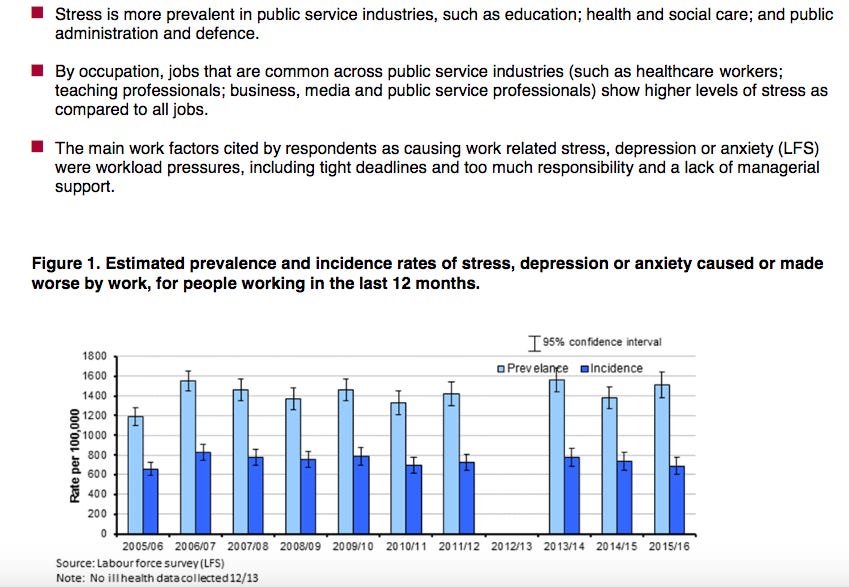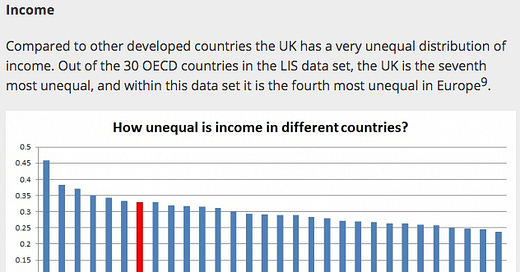If Theresa May really cared about mental health problems, she'd reverse the Tory policies that cause them
Prime Minster Theresa May launched her “shared society” vision for Britain on Monday (9th January 2017) and claims that a large part of the focus will be on “mental health problems” — particularly those affecting young people.
However, rather than tackling wealth & societal inequalities, working conditions, poverty and the multitude of other systemic drivers of mental illness, May is focusing on changing the way that mental illness is perceived — by providing a pithy range of services aimed at young people, the workplace, and getting those who suffer from mental illness into work. These services focus on changing the individual's perception of the world — and teaching them coping strategies if they are suffering. They do not address the systemic underlying causes of mental illness. This, in turn, means that the underlying systemic causes remain unchecked — and makes much-needed political action less likely as a result.
Many of the Tories' policies have had a disastrous effect on sufferers of physical and mental health illness — and no doubt have created many new sufferers along the way. Ongoing cuts to NHS funding, pay freezes for public sector workers, benefits cuts, sanctions, the treatment of disabled people by the DWP, cuts to family benefits, zero hour contracts — amongst many other things have all contributed to the ever-growing inequality and insecurity that drives high rates of mental illness. The very idea that the Tories have any concern for helping those with mental illness is frankly laughable, given that their own policies are direct causes of mental illness.
A huge amount of research has been carried out looking at the effects of income and wealth inequality. It shows that societies with higher levels of income inequality also have higher levels of physical and mental health illness. One large-scale study by the Equality Trust illustrates that the UK is the 7th most unequal out of 30 OECD countries.

Source: equalitytrust.org.uk
They also break down wealth distribution in Britain.

Source: equalitytrust.org.uk
Since the neoliberal period began under Thatcher in the late 1970's, the UK has become increasingly unequal.

Source: equalitytrust.org.uk

The study shows that the more unequal a society is the greater the risk of mental illness.

Source: equalitytrust.org.uk
If May and the Tories were serious about tackling mental illness then perhaps they could start by addressing the grotesque levels of income and wealth inequality that add significantly to rates of mental illness. Perhaps they could start by raising the rate of corporation tax? Perhaps they could tax the rich properly so that they contribute back to society? Perhaps May could close the tax loopholes that the rich and corporations use?
Tory austerity policies have been directly linked to an increase in mental health illness. Cuts in housing benefit have led to a 10% rise in mental health problems — particularly depression. Children from poor families have been disproportionately affected by austerity as was highlighted a damning United Nation's investigation into the impact of Tory austerity.
Disabled people have been some of the most severely affected by austerity - especially those with pre-existing mental health conditions. The Royal London College of Psychiatrists warned and pleaded with former Secretary of State for the Department for Work and Pensions (DWP), Iain Duncan Smith, not to cut Employment and Support Allowance (ESA) for fear of the impact this would have on people with mental illness — of course, the Tories proceeded with the cuts anyway.
As well as this DWP policy and treatment of claimants in receipt of Jobseekers Allowance (JSA) and disability benefits: ESA and Personal Independence Payments (PIP) have been linked multiple times to suicides and deaths, partly through the cruel, immoral sanctions regime.

Source: Royal College of Psychiatrists — rcpsych.ac.uk
Within the workplace, Tory policies have led to excessive workloads, hours, a lack of job security, and many other negative things that lead to employees suffering mental illness.

Source: hse.gov.uk
During her Shared Society Speech May said:
For too long, mental illness has been something of a hidden injustice in our country, shrouded in a completely unacceptable stigma and dangerously disregarded as a secondary issue to physical health. Yet left unaddressed, it destroys lives, separates people from each other and deepens the divisions within our society. Changing this goes right to the heart of our humanity; to the heart of the kind of country we are, the attitudes we hold and the values we share.
May's plan involves a raft of minor measures...

Source: BBC
The appointment of Mind's Chief Executive Paul Farmer to carry out a review on “improving support in the workplace” will, no doubt, be seen as yet another blow to sufferers of mental illness, some of which protested against his involvement and close links to the DWP in October last year.
May doesn't even try to address the underlying problems that contribute so much to mental illness in this country, mainly because her government is largely responsible for creating them.
Instead of tackling these issues, May is focusing on changing the way that individuals perceive the society they live in — rather than tackling some of the fundamental underlying causes of mental health problems. This, of course, means that people are less likely to seek political solutions, and instead, will be focused on changing themselves to adapt to ever-worsening circumstances.
NHS mental health services remain largely underfunded — the NHS itself is, of course, in a (by now) perpetual state of crisis due to reckless Tory policy, and a desire to privatise the service.
If May really cared about mental health then she would reverse the Tory cuts that have inflicted so much damage on the people that are at the sharp end of them.



